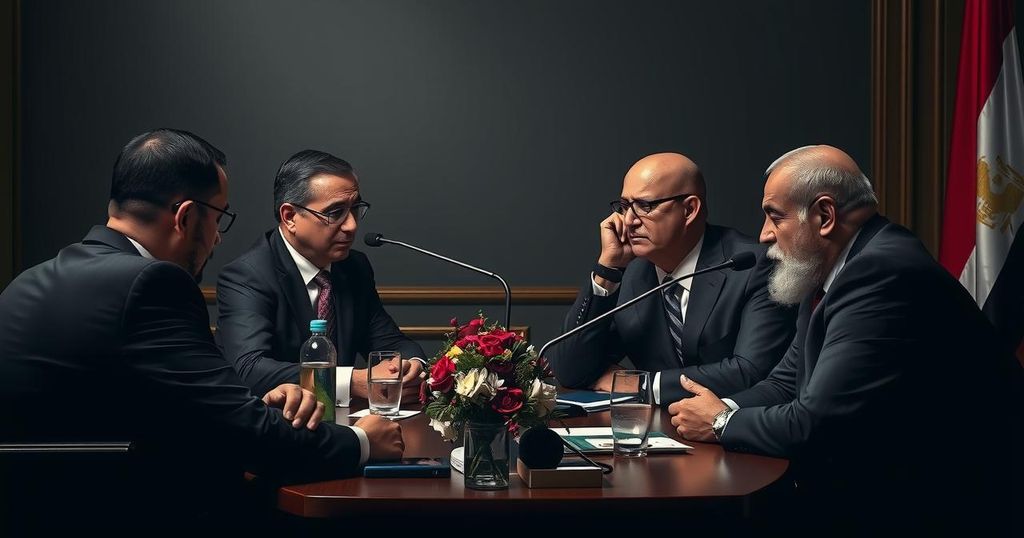Egyptian President Abdel Fattah el-Sissi has proposed a two-day ceasefire between Israel and Hamas to secure the release of four hostages. The proposal includes potential humanitarian aid for Gaza and prisoner releases. Israel’s response is pending, while Egypt continues to act as a mediator amidst escalating regional tensions following recent hostilities.
Egyptian President Abdel Fattah el-Sissi has formally proposed a two-day ceasefire between Israel and Hamas, aimed at facilitating the release of four hostages currently held in Gaza. The proposal, announced on Sunday, also includes possible provisions for the release of some Palestinian prisoners and delivery of humanitarian aid to the besieged region. Currently, there has been no official response from either Israel or Hamas, although discussions are expected to proceed in Qatar, which is serving as a key mediator in the ongoing conflict. President el-Sissi characterized the ceasefire as a necessary step to “move the situation forward,” suggesting an inclination towards negotiations that may ultimately lead to a more lasting resolution. Previous discussions regarding a long-term ceasefire have faced significant obstacles. Hamas has demanded the withdrawal of Israeli forces from Gaza as a precondition, while Israeli Prime Minister Benjamin Netanyahu has declared that military operations will persist until Hamas is dismantled. To date, no ceasefire has been implemented since last November. Coinciding with the announcement of el-Sissi’s proposal, Israel’s Mossad chief visited Doha for talks with Qatar’s Prime Minister and the CIA chief, reflecting renewed efforts to mitigate the ongoing violence and address regional tensions that have intensified following Hamas’ attack on southern Israel on October 7, 2023. This conflict has escalated into a multi-front situation, with Israel engaged in hostilities against Hamas and Hezbollah, both of which are backed by Iran. Recently, Israel struck Iranian positions in response to Iran launching approximately 200 cruise missiles towards Israel on October 1. Iran’s Supreme Leader, Ayatollah Ali Khamenei, has urged a tempered response towards Israeli actions while refraining from calling for direct retaliation. Prime Minister Netanyahu has claimed progress in diminishing Iran’s military capabilities, especially regarding its missile production efforts. Damage to two Iranian military facilities associated with missile and nuclear weapons programs has been confirmed through satellite imagery. During a government memorial commemorating the anniversary of the October 7 attack, Israeli Defense Minister Yoav Gallant stressed the necessity for “painful compromises” to secure the hostages’ release, acknowledging that military solutions alone might not be adequate. Netanyahu faced public discontent as protesters interrupted his address, expressing their grievances regarding government shortcomings in ensuring national security and the rescue of the 70 hostages believed to still be in Hamas’ custody. The situation in Lebanon also continues to exhibit volatility, with Hezbollah increasing its assaults on Israeli positions amidst the ongoing conflict. Israeli airstrikes in southern Lebanon have resulted in numerous casualties, underscoring the broader ramifications of the conflict on regional stability. Additionally, violence in Israel has escalated, evidenced by a truck attack near Tel Aviv that resulted in one fatality and over 30 injuries, attributed to an Arab citizen. In Gaza, recent Israeli airstrikes reportedly killed at least 33 individuals, predominantly women and children, as the offensive in the area persists. The United Nations Secretary-General has remarked that the conditions for Palestinians in Gaza are “unbearable.” According to the Gaza Health Ministry, over 42,000 Palestinians have lost their lives since hostilities erupted following the Hamas attack that killed around 1,200 Israelis and resulted in roughly 250 hostages being taken. The continuous violence has left much of Gaza in ruins and displaced approximately 90 percent of its population, marking a tragic chapter in the protracted Israeli-Palestinian conflict.
The ongoing conflict between Israel and Hamas has resulted in escalated hostilities since the attack on October 7, 2023, leading to a humanitarian crisis in Gaza. The proposed ceasefire by President Abdel Fattah el-Sissi aims to provide temporary respite and address the urgent need for humanitarian aid in the region. Egypt’s mediation efforts reflect its strategic role in Middle Eastern diplomacy, particularly given its geographical proximity and historical relationships with both Israel and Palestine. Previous negotiations for a long-term ceasefire have failed primarily due to conflicting demands from both sides, making the recent proposal particularly significant as stakeholders seek to mitigate further violence.
In summary, President Abdel Fattah el-Sissi’s proposed two-day ceasefire represents an important opportunity to facilitate a peaceful dialogue between Israel and Hamas, potentially allowing for the release of hostages and humanitarian aid to Gaza. However, the absence of responses from either party and the historical challenges encountered in previous negotiations raise concerns about the feasibility of this initiative. As regional and international actors remain engaged in mediation efforts, the necessity for a sustainable resolution to the Israeli-Palestinian conflict remains more urgent than ever.
Original Source: www.newsweek.com






